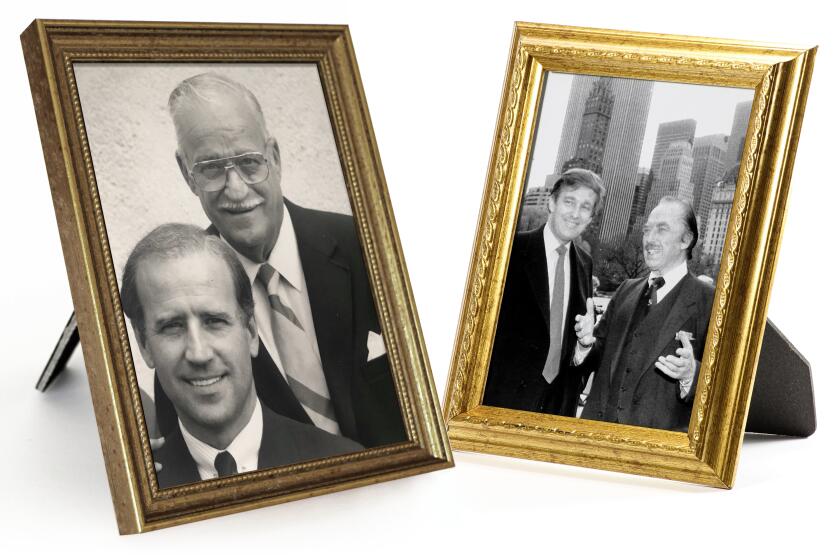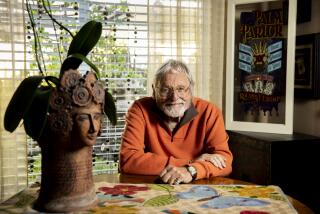Opinion: Fatherās Day invites lots of gender stereotypes. But my dad doesnāt fit any mold

There are a lot of tired tropes about fathers: the father who left the family, or secretly harbored another family, or who was always traveling or never there to begin with, an eternal ghostly absence. Thereās the mad-men-era workaholic dad and the disciplinarian āwait until your father gets homeā dad who strikes fear into many a childhood heart. Thereās the well-meaning but oblivious dad and the coach dad who energetically yells corrections from the sidelines. Then thereās the divorced dad, who sees his kids only on the weekends, takes them out for ice cream on school nights and loves to break all the mom rules.
But my dad, and many others, thankfully does not fall into these rigid categories.
My dad, 86, grew up in New Rochelle, N.Y., with an Italian mother and Jewish Russian immigrant father. In 1955 he got into Harvard because, in addition to having good grades, he could run incredibly fast (in college he would place seventh in the NCAA finals as a low hurdler in the 220-yard race). Amid the silent quotas for Jewish students at the time, Harvard made it clear that his high athletic ability was a key factor in his admission. Years later, he moved out to L.A., became a successful real estate developer and met my mom in group therapy.
I abandoned my hometown Sacramento after losing my father early on. But seeing the city so lush, lets me view it and my memories with fresh eyes.
As his life story suggests, my dad is unique for a lot of reasons. But most of all heās unique for being a father who defies stereotypes, mainly because of his determination to be fully present in my life. After my parents divorced in 1984, when I was 7, he insisted on dual custody, an unexpected effort from a father of that era.
I switched houses every week until I left for college. During his week, my dad ā an alpha male who radiated masculinity ā was both a mother and father. I remember him trying to fix my hair into a ponytail, pulling the strands over my ears while I looked on in horror at the mirror. He wore the glittery paper crowns I made for him to the grocery store. Once, because I directed him to (I played the queen and he the court jester), he ate a rose, chewing on it thoughtfully before concluding it tasted like chicken.
During long car drives he taught me how to āhit the ball back over the netā in a conversation, to help remedy my painful shyness. Only later did I realize how important it is to know how to talk to people. Sometimes, when I find myself in an awkward social situation, I still picture that net and the tennis ball sailing gracefully over it.
A perfectionist, my dad sometimes lost his temper when I didnāt clean my room, sharpen my pencils or keep my homework organized. But after a big fight, he would always apologize, understanding the necessity of repair.
A string of failures and heartbreaks gave way to the second chances I needed.
Once, he drew a picture of a large box with all these other little boxes inside. Leaving the others blank, he colored in one little box and explained that it represented our fight, the bad feelings we both harbored. āBut,ā he added, ālook at all the other blank boxes.ā He then slowly erased the fight box, showing how apologizing eased the hurt, and that any one disagreement between us would never affect the whole of our relationship.
Recently, after a screaming match with my own daughter, I drew the same picture. I could tell how reassured she felt by this visualization, which made an abstract idea concrete: I would always love her, no matter what she said or did.
In college, during my study-abroad year, an ex-boyfriend followed me to Europe. When I refused to see him, he grew increasingly belligerent and threatening. Somehow, my dad got the FBI involved and my ex magically stopped contacting me. I never found out how my father managed this.
After college, I lived in London with my fiance, but after a few years and lots of red flags, the relationship soured. I called my dad one night, confessing that I didnāt want the wedding to go forward, even though 300 invitations had already been sent out. I yearned to come home. Without missing a beat, he replied, āGreat. Iāll call the hotel and cancel the wedding. Donāt worry about the deposit.ā
It was a big deposit.
President Biden honors a dad he said promoted dignity and honor, while Donald Trump says his ātoughā father taught him the art of bargaining.
Years later, after I lost my first child, my dad visited me every day for six months and joined me at a coffee shop around the corner from my house. We sat together in the blinding afternoon sun, my eyes swollen and red from crying, the sudden loss sinking me. He listened to me talk, resisting his natural urge to problem-solve, and just acknowledged the depth of my pain. For those 30 minutes we spent together each day, I felt less alone.
Even now, in his late 80s, my dad will swing by for a brief chat, ready to talk over whatever thorny parenting issue Iām struggling with. Heāll say he needs to āsleep on itā and the next morning Iāll find an email from him with a list of creative ideas, in bullet points.
Our culture could use more stories about different kinds of fathers ā including those who are inherently nurturing, who embody both masculine and feminine energy, who willingly share the emotional and domestic labor with their spouses, who show up for their children without question (and without expecting a medal for it). We should expect the same dedication from fathers as we do from mothers, and not marvel at a dad with his toddler in the grocery store or congratulate him for scheduling a pediatrician appointment.
My dad is not the only father with wisdom to share, though I do often feel he belongs in a category of his own. Every day, I strive toward his ability to show up and pay attention, with the hope that my children experience the same unshakable love and commitment I feel as his daughter.
Alexis Landau is the author of the novels āThe Empire of the Senses,ā āThose Who Are Savedā and āThe Mother of All Things.ā
More to Read
A cure for the common opinion
Get thought-provoking perspectives with our weekly newsletter.
You may occasionally receive promotional content from the Los Angeles Times.













